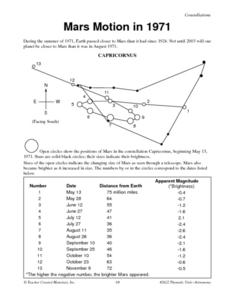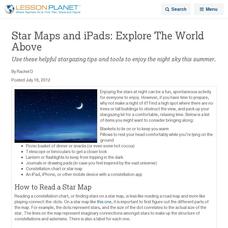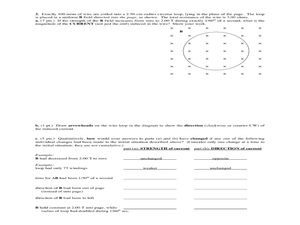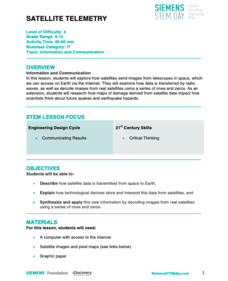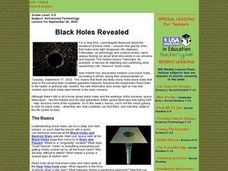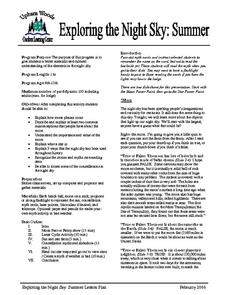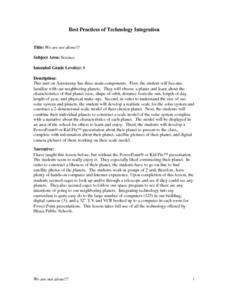Curated OER
Mars Motion in 1971
In this science worksheet, students read about the summer of 1971 when the Earth passed closer to Mars than it had since 1924. Students also learn about the retrograde motion of Mars as seen from Earth.
Curated OER
Star Maps and iPads: Explore The World Above
Use these helpful stargazing tips and tools to enjoy the night sky this summer.
NASA
Determining the Nature, Size, and Age of the Universe
Prompt scholars to discover the expansion of the universe themselves. Using photographs of other galaxies, they measure and then graph the size and distance of each. Finally, they draw conclusions and prove the universe is...
University of Colorado
The Jovian Basketball Hoop
A radio receives radio signals, converts them to an electrical signal, then converts this signal to a sound signal, and amplifies the sound so people can hear it. Class members use this information to create a short-wave radio antenna...
Texas State University
Earth: Deposition and Lithification
Geology geniuses analyze sediment samples with a hand lens and sort according to physical characteristics. They also learn about the processes of cementation, compaction, and lithification within the rock cycle. The lesson plan is...
Curated OER
Exploring Mars
Students, working in small groups construct scale models of the planets and solar system. They examine images of Mars and discuss what might have caused the features. They record facts about their planetary research in their journals and...
Curated OER
Fall 2003 Midterm Exam #2
Your physics students will really shine when they take this midterm exam. It covers a variety of concepts dealing with electromagnetic spectra, electricity, and motors and it provides a variety of question styles.
Discovery Education
Satellite Telemetry
Satellites require rockets to launch, but it doesn't take a rocket scientist to understand them. Future engineers learn about how satellites send data to Earth and how to interpret satellite images. They see how radio waves play a role...
International Technology Education Association
Singin' the Black and Blues
How does the color of the sky change from blue to reds and oranges to black? An illuminating lesson explains how light travels through different mediums using the sun's light as an example. By examining diagrams and illustrations, pupils...
Curated OER
The Impact
Students study different inventors and inventions. In this invention introduction lesson students pretend that they are an inventor and come up with their own invention.
Curated OER
Blazing Gas
Fourth graders read and discuss the sun and the energy we use on Earth from the sun. In this sun lesson plan, 4th graders discuss the solar system, planets, and answer short answer questions.
Curated OER
Vocab-u-lous! Build a Fabulous Vocab: Words Beginning with SL
In this vocabulary worksheet, students select the best word to complete the sentence. They are challenged by the difficult words that contain a sl-blend.
Curated OER
Lesson 4 Activity 1: Mapping the Third Dimension
Students work in pairs to construct a simple stereoscope.
Curated OER
Classify By Topic
Students explore and evaluate poetry. In small groups, they read and summarize poems, complete a handout, create and perform a dramatization of a poem, and write a journal entry in response to their performance.
Curated OER
Working With Scientific Notation
In this scientific notation activity, students read about the discovery of new planets. They use scientific notation to identify the number of miles from one planet to the next. Students determine how long it would take to travel, when...
Curated OER
Black Holes Revealed
Students explore the concept of black holes through an interactive program. They explore how they form and what materials form them. They can also visit websites in which they can research radio transmission between the Earth and space.
Curated OER
How Do We Explore Strange Environments?
Students identify and label the different parts of a robot, rover, or a spacecraft. They discuss and record all of the features their robot will need to accomplish its mission and be able to explain why they chose these features to...
Curated OER
Exploring the Night Sky: Summer
Learners explain how moon phases occur. They describe and explain at least two common misconceptions that people have about the moon. Students explain what a star is. They explain 3 ways that the night sky has been used throughout history.
Curated OER
Nature of Science and Measurement Review
In this nature of science and measurement worksheet, students answer 30 questions about experimental design, pure science vs. applied science, density, metric conversions and dimensional analysis.
Curated OER
How Old Are the Stars?
Students determine the age of a star cluster by observing, measuring, and plotting astronomical data. They examine the Jewe lbox cluster, located within the southern constellation Crux and determine its age.
Curated OER
Magnify It!
Young scholars view objects of various sizes from several viewing distances to discover that their visual field is limited. They record what they see and compare their observations with classmates. They conduct more structured experiments.
Curated OER
Cosmic Wheels
Learners build a scale model of the Solar System and determine the time other planets take to travel around the Sun in comparison to the time of the Earth's revolution. The velocity of the planets are also determined in this lesson.
Curated OER
We Are Not Alone!!!
Eighth graders explore the area of astronomy. They explore Earth's neighboring planets. Students research a planet's characteristics. They develop a scale model of the solar system and a narrative about the planets.
Curated OER
Energy and Energy Resources
In this energy and energy resources worksheet, students complete 14 fill in the blank questions in the form of word scrambles, twisters, and teasers.


